Welcome students to an amazing analysis of Class 6 Social Science Chapter 10 “Grassroots Democracy – Part 1 Governance”. We have presented these solutions in a simple and interesting manner to ensure that you get the maximum benefit from them. Feel free to go through them in detail – we know they will be of enormous value to you.
Find Solutions for NCERT Class 6 Social Science Exploring Society: India and Beyond Chapter 10 “Grassroots Democracy – Part 1 Governance,” here
Text Book Page no 149
The Big Questions
1. What is the meaning of ‘governance’?
Answer:
Governance means the way rules and decisions are framed to run a community or country smoothly. It involves setting up rules and laws that help everyone live together safely and fairly. Leaders and authorities make sure these rules are followed so that people can live in an organized and peaceful society.
2. Why do we need a government?
Answer:
We need a government for many reasons, as it plays a crucial role in managing society and ensuring the well-being of its people. Some important functions of the government include:
- The government frames and implements laws to prevent conflicts and maintain peace.
- It offers essential services like healthcare, education, transportation, water supply, and sanitation so that all citizens may benefit from them.
- The government provides food, medical services, and education at affordable prices, especially to the needy.
- It works to conserve natural resources, forests, and wildlife and protect the environment from pollution and exploitation.
- The government protects the country from enemy attacks and terrorism.
- It builds and maintains roads, bridges, airports, and other facilities.
- It warns people about natural disasters and acts during floods, earthquakes, and storms to protect people and provide relief.
- Through courts and legal systems, the government ensures that justice is delivered and people’s rights are protected.
All these roles help ensure that society functions smoothly, and the needs of the people are met.
3. What is the meaning of ‘democracy’? Why is it important?
Answer:
Democracy is a system of governance adopted by most countries of the world. The word ‘democracy’ comes from two Greek words — dēmos meaning ‘people’, and kratos meaning ‘rule’ or ‘power’; so ‘democracy’ literally means the ‘rule of the people’. In a democracy, people choose their representatives by voting. The elected representatives represent the people’s voice and address their concerns by making laws on their behalf.
Democracy is important because it helps make sure that the government is fair and works for the good of everyone, and that all people enjoy equal rights.
Text Book Page no 150
LET’S EXPLORE
Describe the two pictures given in Fig. 10.1 on page 151 —what differences do you see between them?
Answer:
The first picture depicts an orderly and organised city road scene, while the second picture depicts a chaotic and disorderly road scene.
| First Picture | Second picture |
| Drivers are following traffic rules like waiting for their turn at the traffic signal, maintaining a safe distance from the vehicle in front, driving in their respective lanes. | Traffic rules are being violated by drivers who seem to be in a hurry. Drivers are not keeping to their lanes, so we see a bus and a car on the verge of collision as they are driving on the same lane from opposite sides. |
| The cyclist is riding in the designated lane for cycles. | Cyclists are riding in the middle of the road which is risky and illegal. |
| The pedestrians are all using the sidewalks, no one is jay walking. | The pedestrians are jay walking They are weaving in and out of the traffic. There are more people walking on the road than on the sidewalks. |
| The traffic is flowing along smoothly because rules are being followed. | There is utter chaos as the drivers, cyclists and pedestrians are violating traffic rules indiscriminately. Each one is doing as they please but at the cost of endangering their own lives and that of others as well. There is a child standing on the roof of a car which is dangerous. |
How do you connect this with our discussion on rules?
Answer:
These pictures prove that rules are essential to maintain discipline. When rules are strictly followed as in the first picture, everything is smooth and systematic. The reverse is true for the second picture where rules are flouted and there is utter chaos as a result. Rules are framed so that people may live in harmony without friction or without endangering themselves and others as well.
What are some of the rules in your school? Who made them?
Answer:
Some of the rules in my school are as follows:
1. All students must be punctual and reach school before the morning prayer.
2. All students must attend school regularly. In case of absence due to illness, a medical certificate must be submitted.
3. Students should invariably be dressed in a clean uniform. Girls must not wear make-up, nail polish, or flashy jewellery.
4. Students should keep the school premises clean and use bins to throw waste instead of littering the school yard.
5. Students should be respectful towards teachers and fellow students.
6. Students are not allowed to use mobile phones or tabs or laptops in class.
These rules are usually made by the school administration consisting of the principal and teachers, who want to make sure everyone learns well and stays safe in school.
Text Book page no 153
LET’S EXPLORE
Can you identify the categories of public service or other activities that are represented in the ten pictures in Fig. 10.2 on page 152?
Answer:
The images show different public services or activities:
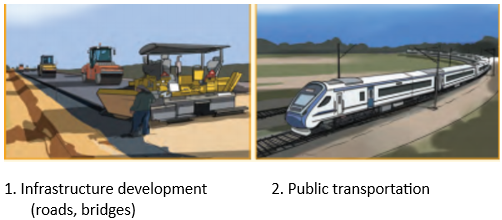
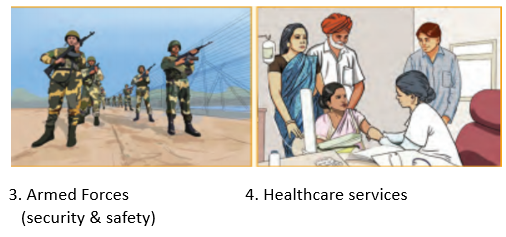
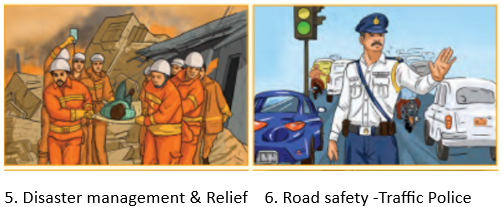
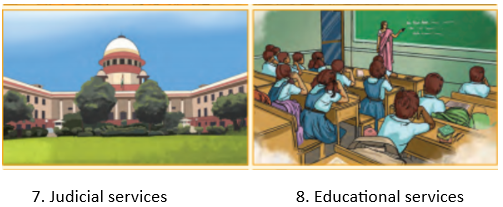
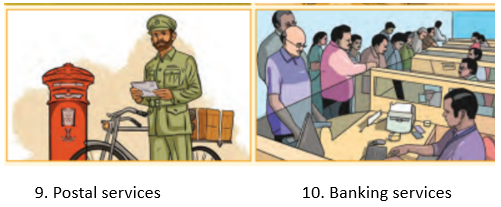
What role do you think the government plays in each of these activities?
Answer:
The government is responsible for providing all kinds of public services like health, education, security, and more to all citizens. It makes sure these services are delivered to everyone on time and as seamlessly as possible. To do this, the government raises funds through taxes and builds the necessary infrastructure like schools and hospitals, roads and bridges, engages skilled workers, and makes sure the services run efficiently. All levels of government – from the central to state and local authorities – work together to provide these services. The government also ensures that the benefits reach even the marginalised communities by creating policies for fair distribution. In short, the government plans, funds, and manages these activities to benefit everyone, keeping us safe, educated, and healthy.
Can you think of other aspects of your daily life where the government plays an important role?
Answer:
There are many other aspects of our daily life where the government plays an important role to make our lives better, for example:
(i) The government ensures steady flow of electricity.
(ii) It provides regular supply of clean water.
(iii)The government appoints inspectors to check the quality and prices of food items and milk.
(iv) It provides internet access for communication and information.
(v) It maintains parks, green spaces and playgrounds.
(vi) It is responsible for lighting of roads and installing CCTVs as a preventive measure.
(vii) It ensures that garbage is collected and disposed of properly to keep our surroundings clean.
(viii) The government makes rules to reduce air pollution, water and noise pollution
(ix) The government promotes recycling and manages waste, so less garbage is dumped in the environment.
(x) The governments initiates programs to plant trees and protect forests, which helps reduce pollution and keep the air fresh.
Text Book Page no 154
Let’s Explore
Explain how the three government organs are at work in the case of the cybercriminals described above. How do they intervene?
Answer:
The three organs of government—the Legislature, the Executive, and the Judiciary—work together to deal with cases like the case of the cybercriminals. Here’s how they intervene:
1. The Legislature (Law-Making)
The Legislature makes laws that define what cybercrimes are and the punishments for committing them.
Example: Laws like the Information Technology (IT) Act in India are framed by the Legislature to protect people against online fraud, hacking, and other cybercrimes which are occurring very frequently.
2. The Executive (Law Enforcement)
The Executive administers the laws made by the Legislature. It includes the police, investigation agencies, and other authorities who enforce the law.
Example: When a cybercrime is committed, the police and cybercrime agencies investigate the crime, collect evidence, and catch the criminals. Thus, they enforce the laws created by the legislature to protect people from these crimes.
3. The Judiciary (Interpretation of laws and delivering Justice)
The Judiciary interprets the laws and makes decisions in court. If someone is caught committing a cybercrime, they are taken to court. The judges listen to the case and decide if they are guilty or not.
Example: In the case of cybercriminals, the court will hear the evidence and decide the punishment based on the laws made by the Legislature. The Judiciary ensures that justice is served fairly.
These three organs of government working together help to protect society from cybercrimes by making laws, enforcing them, and delivering justice.
Text Book page no 155
LET’S EXPLORE
As a class activity, can you imagine the sort of disorder we might witness if all three organs were under the control of the same group of people? Can you describe any such real-life situation you may have heard of?
Answer:
As a class activity, let’s imagine what could happen if all three organs of government—the Legislature, the Executive, and the Judiciary—were controlled by the same group of people. The same people would make the laws, enforce them, and decide if someone has broken the law. The following situations may arise:
Unjust Laws or discriminatory laws: If the same group controls everything, they would likely make laws that only benefit themselves. For example, they could make laws that curb people’s right to free speech to prevent people from criticising or challenging them.
Abuse of Power: If the same group has all the power, they could misuse it. They could punish people unfairly, take money from public funds, or even put innocent people in jail, knowing that no one can stop them.
Denial of Justice: If the Judiciary is not independent, people won’t be able to get a fair trial or justice. If the same people who committed a crime are also to decide if they should be punished or not, there can be no justice because they would never convict one of their own.
Real-Life Example:
A real-life situation where something like this happened is in Nazi Germany which was a dictatorship. In a dictatorship, one person or a small group control everything. Hitler in Nazi Germany and his associates made their own laws, controlled the police and army, and even controlled the courts. They passed discriminatory laws curbing the rights of Jews and subjecting them to inhuman torture of the worst kind. They were stripped of their civil rights, their property was confiscated, and they were sent to concentration camps where about 6 million Jews were killed.
This activity helps us understand why it’s important for these three organs to remain separate to maintain fairness and balance in society.
Text book Page no 156
LET’S EXPLORE
Observe the table (Fig. 10.5). Highlight the functions and responsibilities that affect your life the most.
The table shows different functions and responsibilities of the government at various levels (local, state, national). Let’s highlight the ones that affect our lives the most:
Answer:
The functions and responsibilities of the government that affect our lives the most are:
Education: The government ensures that everyone has access to education and has a say in the school curriculum, so this function affects us the most as we are students and our curriculum is also framed by the government.
Healthcare: This function affects all of us directly. During the pandemic the government organised vaccinations for a large section of the population to ensure that all remained healthy. but on a regular basis it also holds camps for polio vaccination etc and government hospitals provide free treatment and medicines to the needy.
Public Transport and Roads: We are directly benefited by this function of the government. Roads, buses, and metro systems and railways are maintained by the government, ensuring that we can commute safely to school or any place we need to go.
Clean Water Supply and Sanitation: Clean drinking water and proper waste management are essential for our daily life and health. The government takes care of these pressing needs.
Safety and Law Enforcement: Safety is an important concern for us, and the government acting through the police and other security forces make sure that laws are followed and that people feel safe in their community.
Ask two or three adults about their connection or interaction with the government – at what levels does it take place and for what purpose
Answer:
We asked a few adults about their connection and interaction with the government and their responses are summarised below in brief:
1. Many adults said they interacted with the local level of government regarding day-to-day problems related to water supply, collection of garbage, and solving local problems like trimming of trees which were brushing dangerously against electricity lines.
2. Their interaction with state governments relates to renewal of driver’s licence, land and revenue matters, and health services at state-run hospitals.
3. The central or national government is approached for issues relating to tax refunds, applying for passports, Pan Cards or Voter’s ID Card.
People’s connection with the government affects various aspects of their lives, from everyday services to more significant needs. This helps us realise how important the government’s role is at all levels.
Text book Page 161
Questions, activities and projects
1. Test yourself —What is the meaning of democracy?
Answer:
Democracy means that the people of a country have the power to choose their rulers. The word ‘democracy’ comes from two Greek words: ‘dēmos’ meaning ‘people’ and ‘kratos’ meaning ‘rule’ or ‘power’. So, democracy means ‘rule of the people’. In a democracy, people choose their leaders by voting. These elected leaders speak for the people and work to solve their problems by making laws. Democracy makes sure that the government is fair and works for the good of everyone, and that all people have equal rights.
What is the difference between direct democracy and representative democracy?
Answer:
Direct Democracy: In a direct democracy, all citizens participate directly in making decisions and laws. This means that every single citizen votes on each important issue.
Representative Democracy: In a representative democracy, citizens elect leaders or representatives who make decisions and frame laws on their behalf. This is the type of democracy most countries follow because it’s easier to control large populations this way.
These systems show how people are involved in decision-making in different ways.
2. Recall the three organs of government. What are their different roles?
Answer:
The three organs of government are the Legislature, the Executive and the Judiciary.
Legislature: This group makes news laws or legislates. It also revises or removes old and obsolete laws. It decides the rules everyone must follow. This is done by an assembly of representatives of the people.
Executive: This organ of the government implements or carries out the laws. It makes sure the laws are followed and takes action when needed. The executive is headed by the head of state (who may be a President or Prime minister or Chief Minister of the state). The ministers, the civil servants and any agency entrusted with enforcing ‘law and order’ like the police are part of the executive.
Judiciary: This organ is the system of courts which decide if any law has been broken and decides on the punishment to be meted out. Sometimes it also examines whether a law passed by the legislature is just and fair, or if a decision taken by the executive is right.
Ideally the three organs of government must be kept separate although they interact with each other and work together. This is called separation of powers. It ensures that there is a system of checks and balances. This means that each organ of the government can check the functioning of the other two organs and restore balance if one organ exceeds its powers.
3. Why do we need three tiers of government?
Answer:
We need three tiers of government to cater to the vast population and manage different responsibilities at various levels:
Central or Union Government: It deals with matters that affect the entire country, like national security, foreign affairs, communications, atomic energy etc it also formulates national policies.
State Government: It takes care of issues specific to each state, such as education, public health, police services, agriculture, irrigation etc. it also adapts and implements laws made by the central government at the state level.
Local Government: It looks after the needs of cities, towns, and villages, like water supply, roads, sanitation, and local markets.
By having three tiers, the government can focus on local, state, and national issues separately, ensuring that people’s needs are addressed more efficiently.
4. Project: Many of you will remember the lockdown that took place during the COVID-19 pandemic. Make a list of all the actions that were taken at that time? Which tiers of government were involved in managing the situation?
What was the role of each of the organs of government?
Answer:
Project: Actions Taken During the COVID-19 Lockdown
The emergence of Covid 19 in the country in early 2020 called for immediate action. The Indian government took a pro-active and pre-emptive approach aimed at preventing infections, saving lives and minimising the impact of the deadly virus which was previously unknown.
Actions Taken:
Lockdowns and Curfews: Restrictions were placed on movement of people to control the spread of the virus.
Health and Safety Measures: Hospitals were prepared, COVID-19 testing centres were set up and free testing was done in government approved laboratories to combat the spread of the virus. Quarantine facilities were created to isolate those who had been exposed to the virus or tested positive, to contain spread of the disease.
Upgradation of existing health care facilities: The government upgraded existing hospitals on a war-footing and constructed several makeshift hospitals to treat Covid patients.
Public Awareness Campaigns: Information on preventive measures like wearing masks, social distancing, and handwashing was shared over television, newspapers and social media.
Supply of Essentials: Ration shops to supply food grains, medical supplies, and delivery services were organized to ensure people had access to food and medicine.
Covid vaccines: Steps were taken by the government to increase the manufacturing of Covid-19 medicines in the country.
Vaccination Drive: The Indian government launched the world’s largest vaccination programme covering the entire length and breadth of the country.
Economic Relief Packages: Financial support was provided to those affected by the lockdown, including workers and small businesses.
Online Learning and Work: Educational institutions and many businesses were closed, while others shifted online.
Travel Bans: International and domestic travel was restricted.
Universal screening: Compulsory screening of all travellers to India was introduced to contain the spread of the virus.
Tiers of Government Involved:
Central Government: Made sweeping countrywide decisions like announcing lockdowns, setting health guidelines, and managing vaccine production and distribution.
State Government: Controlled healthcare facilities, supervised the situation closely in their regions, and implemented local lockdowns and restrictions.
Local Government: Streamlined the delivery of essential goods and services, upheld local law and order, and organised public awareness drives.
Role of Each Organ of Government:
Legislature: Passed emergency laws and approved funding for healthcare, economic relief, and vaccine distribution and gave emergency powers to the executive to handle the crisis.
Executive: Implemented and enforced the lockdown, managed healthcare, and distributed essential services like food and medical supplies.
Judiciary: Ensured that the lockdown and restrictions were applied fairly, reviewed any legal challenges during the pandemic, and declared the Indian Covid vaccine as safe.
This shows how all three tiers and organs of government worked together to manage the pandemic and keep people safe.
Frequently Asked questions (FAQs) on NCERT Solutions for Class 6 Social Science Exploring Society: India and Beyond Chapter 10 “Grassroots Democracy – Part 1 Governance”
Our team of competent subject experts, educated both in India and overseas, has thoughtfully crafted these solutions to ensure they are not only accurate but also engaging and easy to understand. Every concept is explained in a lucid and clear manner, making learning enjoyable and helping you grasp the material with ease.
We encourage you to dive into these solutions, as they’re designed to clarify all your doubts and strengthen your understanding of the lesson. You can download the free PDFs anytime for easy access!
And there’s even more on the way—exciting study material and helpful resources are coming soon! Keep visiting our website and don’t forget to join our email list to stay updated and gain free access to all the new content. Happy learning!
Yes indeed! You can download the free PDF versions of these excellent solutions anytime (please look towards the top of the page)!
Absolutely! Our team of skilled subject teachers has carefully thought through every question you may have about Chapter 10 “Grassroots Democracy – Part 1 Governance”, and created these solutions to guide you through each important point. These solutions not only cover the key details but also help you fully understand the chapter’s message.
In Chapter 10 “Grassroots Democracy – Part 1 Governance”, you will learn about governance, the concept of democracy, the different organs of government and the system of checks and balances. The different tiers of government and how they function at the local, state and central level.
As you go through the solutions, take time to read each explanation, and try practising writing out answers under timed conditions. This practice will not only help you understand better but also make you feel more confident, ready for any question that comes your way. Remember, with practice and a positive spirit, you’ll be well-prepared. We’re cheering for you all the way—keep going, and good luck!
Feeling lost with too many study choices or uncertain about how to begin? You’re not the only one—many students face these same struggles. But here’s the good news: we’re here to guide you.
At educationroundtheworld.com, we understand how overwhelming it can be to tackle your studies alone. That’s why our expert teacher-mentors are committed to helping you every step of the way. We’re here to take the stress and confusion out of the equation.
Here’s how we can help: Simply reach out or schedule your first session, and together, we’ll design a personalized, easy-to-follow study plan that’s focused entirely on your success. Imagine a study experience that feels stress free, manageable, and empowering.
Let go of the uncertainty and embrace a path to success with our expert guidance. Your solution is just one step away—start with us today!


